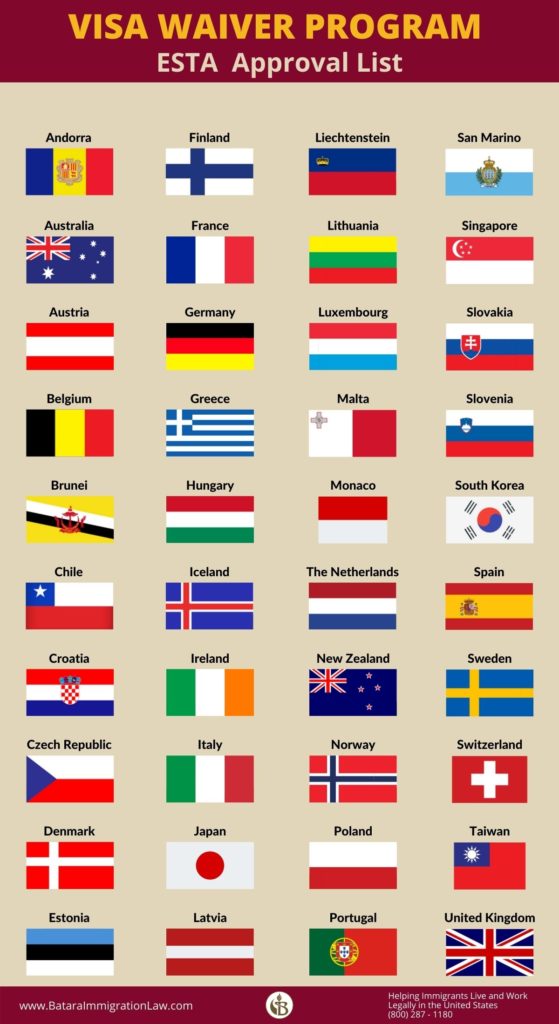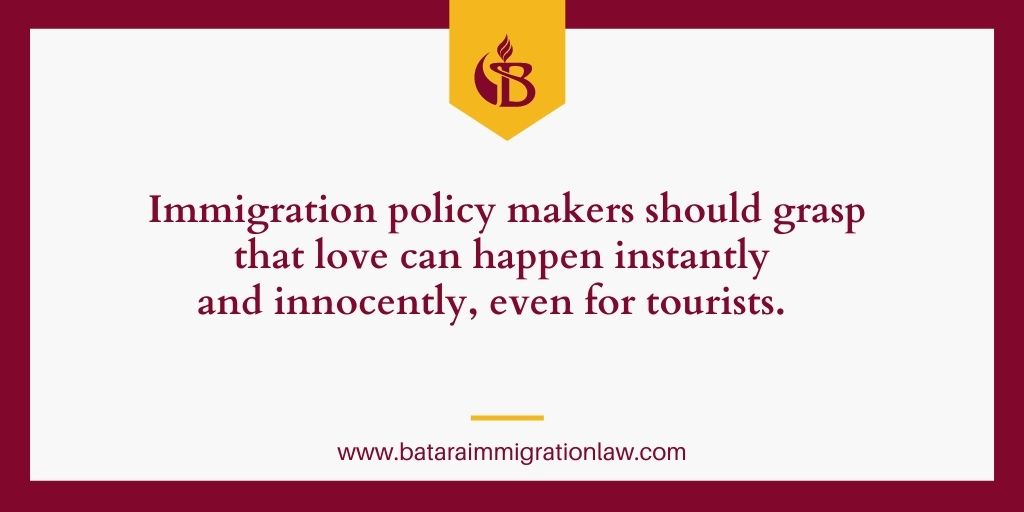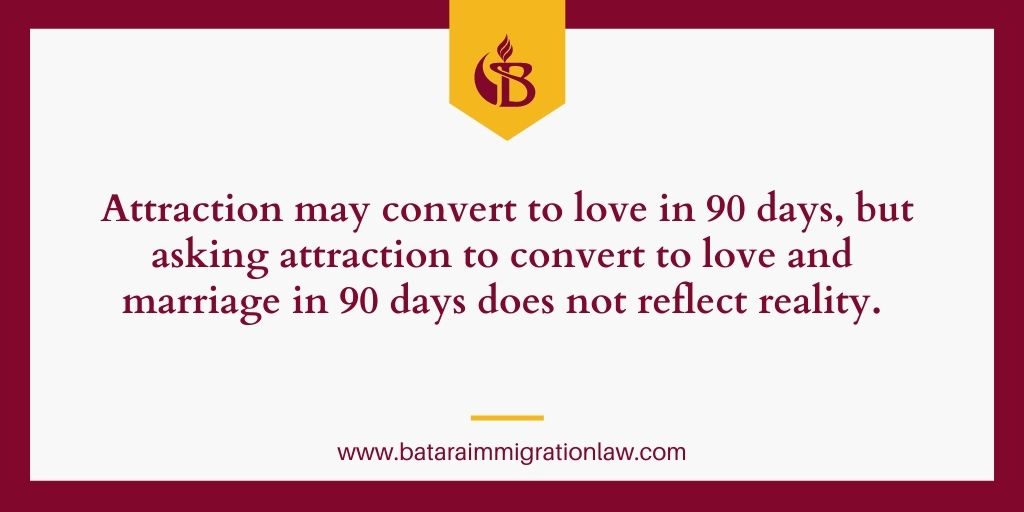
Love happens.
More often than not, love happens unexpectedly.
For immigrants who have entered the U.S. under the Visa Waiver Program, love can lead to deportation – and a ten year to permanent separation from their spouse and children.
Despite years of battling this issue as a green card attorney, I’m still saddened every time government agents fail to grasp love and marriage deserve a second look before family ties are destroyed and immigrants are blindly sent back to their country of origin.
Policy makers, it seems, should grasp that love can happen, instantly, and innocently, even for tourists.
What Is The Visa Waiver Program?
The Visa Waiver Program (VWP) was created in 1986 to facilitate easier travel to and tourism in the United States by individuals from friendly nations. Countries with a history of high illegal entry into the U.S. are excluded.
The program is relatively simple. It allows citizens of certain countries to travel to the U.S. for up to 90 days without obtaining a visa.
To ensure visitors are not security risks, each immigrant must submit information into the Electronic System for Travel Authorization (ESTA) online portal. Once approved, a traveler is pre-approved for visa-free travel for two years.
Membership in the program is not automatic.
Currently, nations seeking membership in the VWP must meet a number of security and travel-related requirements in order to be considered for admittance.
Many people use the terms ESTA and VWP interchangeably. Thus, you’ll hear folks who refer to the Visa Waiver Program as the ESTA Program.
What Countries Are Approved For
The Visa Waiver Program?
At present, there are 40 countries on the U.S. State Department ESTA approval list for the Visa Waiver Program.

(NOTE: Information Updated November 2021.)
- Andorra
- Australia
- Austria
- Belgium
- Brunei
- Chile
- Croatia
- Czech Republic
- Denmark
- Estonia
- Finland
- France
- Germany
- Greece
- Hungary
- Iceland
- Ireland
- Italy
- Japan
- Latvia
- Liechtenstein
- Lithuania
- Luxembourg
- Malta
- Monaco
- The Netherlands
- New Zealand
- Norway
- Poland
- Portugal
- San Marino
- Singapore
- Slovakia
- Slovenia
- South Korea
- Spain
- Sweden
- Switzerland
- Taiwan
- United Kingdom
However, citizens of ESTA countries who have traveled to or been present in Iran, Iraq, Libya, North Korea, Somalia, Sudan, Syria, or Yemen on or after March 1, 2011 (except for diplomatic or military purposes), will not be approved.

Change Of Status For ESTA Entrants
In exchange for the relatively simple entry, visiting immigrants from VWP nations must waive many rights given to entrants under other visa categories.
ESTA entrants are not allowed to contest any removal actions brought by the U.S. government, except for applications for asylum.
Unlike immigrants who visit the U.S. on a regular tourist visa, they cannot extend their stay in the U.S. or change their status to another category.
For instance, consider an immigrant from Portugal who wants to visit the United States. Because Portugal is a Visa Waiver approved nation, he does not need to go through the regular process for a temporary visitor’s visa (known as a B-1/B-2 visa). He can simply apply for an ESTA visa.
After arriving in the U.S., he begins to think about requesting an extension to stay longer than the 90 days visit allowed by the VWP program and exploring opportunities to study at a college (under a temporary F-1 visa) in Pennsylvania.
Under the VWP, neither option is allowed. A Visa Waiver Program traveler cannot remain in the United States longer than 90 days nor seek to change their visitor status to another type of visa.
Adjustment Of Status To Permanent Residence For VWP Entrants
Some individuals, while visiting the United States, decide they want to become a lawful permanent resident.
This process of becoming a green card holder is known as adjustment of status. To qualify, immigrants must be present in the U.S. and have been admitted through a lawful entry.
In addition, immigrants can only can seek to win permanent resident status only if he or she is an immediate relative of a U.S. citizen – that is the spouse, child under 21, or parent of a U.S. citizen.
Even this provision has been historically limited under the VWP by immigration authorities.
If a family-based petition had been filed within the 90 days authorized under the VWP, an immigrant would be allowed to have his case reviewed by an immigration judge if the U.S. Customs And Enforcement (ICE) seeks to deport him.
After 90 days, the VWP entrant was not entitled to an immigration court hearing or to having his application reviewed by an immigration judge.
Having practiced deportation defense for nearly two decades, this 90-day policy has never made sense to me.
This policy is especially short-sighted in situations involving a U.S. citizen who falls in love with an immigrant visiting the country on an ESTA visa.
Attraction may convert to love in 90 days, but asking attraction to convert to love and marriage in 90 days does not reflect reality.

On the one hand, the 90-day rule invites immigration fraud by ESTA entrants who are not allowed to have a dual intent upon arrival. On the other, it minimizes genuine marital relationships and promotes shot gun weddings.
In November 2013, recognizing the harshness of this policy, the U. S. Citizenship and Immigration Services (USCIS) announced:
All field offices have been instructed to adjudicate I-1485 applications filed by immigrants who are immediate relatives of U.S. citizens and last entered the U.S. under the Visa Waiver Program but overstayed, even if the application was filed after the 90-day period of admission UNLESS the potential beneficiary is the subject of an INA section 217 removal order.
On the surface, this policy seems reasonable. After all, it appears to allow VWP immigrants who have married a U.S. citizen to move forward with their applications to become a lawful permanent resident, even if they have stayed past 90 days.
However, immigration law is rarely that simple.
Why A Pending I-485 Does Not Guarantee Green Card Success For Visa Waiver Program Immigrants
Deportation and removal orders in the VWP context are not subject to the same safeguards as deportation orders from immigration court.
Immigration and Customs Enforcement (ICE) officers are allowed to remove ESTA overstays without a hearing.
Most significant, based on my experience as a San Bernardino immigration attorney, I’ve learned USCIS policy does not control ICE actions.
ICE is not mandated to “hold in abeyance” VWP deportations to allow immigrants time to process their unfiled or unprocessed green card applications.
This means, despite USCIS willingness to consider late filed applications, many potential permanent residents will never attend a USCIS permanent residency interview.
Like Alfonse.
With the help of Facebook, Alfonse, a 25 year old French citizen, had found his teenage friend, Matthieu. Matthieu was living in San Diego with his parents and two younger sisters. Alfonse made plans to visit them for his summer vacation.
After arriving in California, Alfonse was reacquainted with Matthieu’s family. Alfonse and one of Matthieu’s sisters, Gabrielle, now 21, became attracted to each other. They started going places together, with and without Matthieu.
Alfonse decided to extend his stay a little. He and Gabrielle did not want to be separated. They decided to get married. In the meantime, Alfonse started attending junior college and working part-time. The couple had a child. About six months later, Alfonse’s parents flew to California for the wedding.
Finally, they realized that Alfonse needed to straighten out his immigration situation. Although Alfonse’s 90 day visit had long passed, they did not think this could destroy their dreams. They prepared his immigration papers. Due to the lack of filing fees, they delayed mailing the documents to USCIS.
A few days later, Alfonse was stopped for driving a car with an invalid license tag. The police discovered his immigration papers had expired. They called immigration officials who took him immediately into custody.
He was an ESTA overstay with no permanent residence application on file.
Even though Gabrielle and her family explained that his immigration petition was pending, the ICE officers issued a removal order under the Visa Waiver Program. ICE declined to defer his removal to allow USCIS time to process his paperwork.
Alfonse had no right to contest his removal in immigration court.
They deported him back to France.
Like countless other children of immigrants, Alfonse’s son now lives without a parent who has been deported – due not to a criminal offense.
But, rather, for falling in love.
Under an immigration policy that fails to recognize that sometimes love just happens and offers no opportunity for forgiveness or clemency.
The Cold Heart Of ICE
As Alfonse’s experience shows, VWP immigrants cannot expect any sympathy from ICE officers if they overstay their visa . . . even when the officers’ actions are inconsistent with the recent prosecutorial discretion memorandum issued by Alejandro Mayorkas, Secretary of the Department of Homeland Security.
Otherwise, several of the factors discussed in that directive would have led to Alfonse’s release while the couple’s I-130 immigrant spousal petition and I-485 permanent resident application were under review.
For instance:
- The agency’s civil immigration priorities – not low priority deportation cases involving immigrants with no criminal records
- The circumstances of the immigrant’s arrival in the United States and the manner of his or her entry
- The immigrant’s person’s pursuit of education in the United States, with particular consideration given to those pursuing a college or advanced degree at a legitimate institution of higher education in the United States
- The immigrant’s criminal history, including arrests, prior convictions, or outstanding arrest warrants
- The person’s immigration history, including any prior removal, outstanding order of removal, prior denial of status, or evidence of fraud
- Whether the immigrant poses a national security or public safety concern
- Whether the immigrant has a U.S. citizen or permanent resident spouse, child, or parent
- Whether the immigrant is likely to be granted temporary or permanent status or other relief from removal, including as the relative of a U.S. citizen or permanent resident
All of these factors weighed in Alfonse’s favor.
But when the government has a cold heart of ICE, there is no room for love.
By Carlos Batara, Immigration Law, Policy, And Politics




